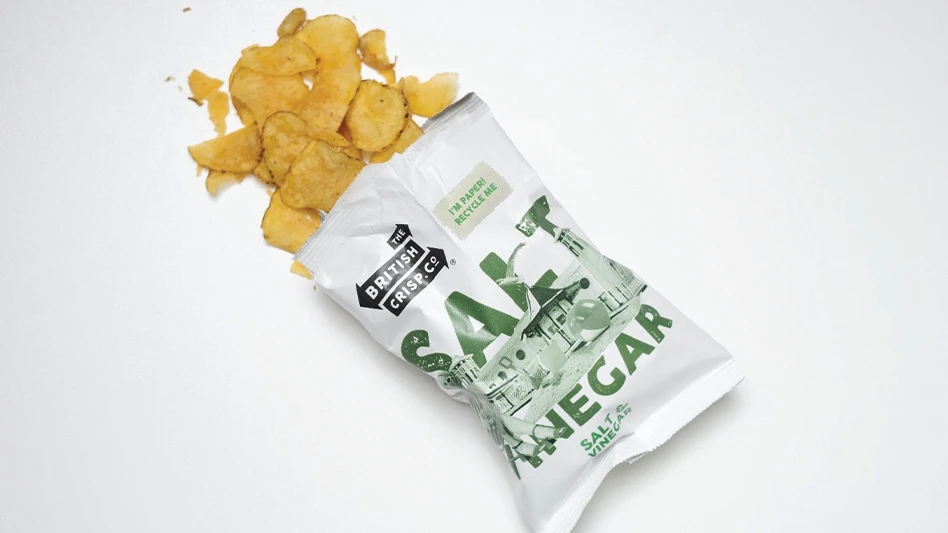
Image courtesy of Aquapak Polymers Ltd.
A comprehensive new packaging study by United Kingdom-based polymers developer Aquapak Polymers Ltd. claims 92 percent of those surveyed plan to stop using plastic in their consumer packaging altogether, with paper and paperboard named as the replacement materials of choice, followed by new polymers, bioplastics and multimaterials.
Research for the report was conducted in March and surveyed 100 U.K.-based packaging experts responsible for packaging research and development (R&D), technology, design and sustainability for fast-moving consumer goods (FMCG) brands. Titled “FMCG flexible packaging: accelerating the move from plastic to paper,” the report was launched at the Rethinking Materials Innovation and Investment Summit in London.
RELATED: Aquapak study examines fashion industry’s commitment to circularity
It notes that despite the commitment to move away from plastic, the timeframe for transition is still considerable, with 27 percent of packaging experts expecting this to happen by 2027, 35 percent by 2028 and 28 percent by 2029. Additionally, 30 percent of respondents describe the move to new packaging materials in their business as too slow, while 58 percent described it as moderate and 11 percent described it as fast. Aquapak notes that 87 percent want the switch to alternative materials to take place more quickly.
Currently, the report says the main barriers to using more environmentally friendly options are the higher cost of alternative packaging, which was cited by 53 percent of respondents, the availability of alternative materials (50 percent) and ensuring the functionality and product protection remains the same (46 percent).
When asked about the key drivers that would help the FMCG sector speed up new material development and implementation, research shows 70 percent of respondents believe more ambitious recycling targets are key, 62 percent want to see increased investment in new materials and 54 percent say greater collaboration to accelerate R&D is needed. Half say an industrywide commitment to move away from conventional plastic is necessary, while 47 percent cite tighter environmental regulation through taxation of materials with poor environmental performance is important.
“Our study shows that the FMCG sector is highly cognizant of the need to move away from conventional plastics to more environmentally friendly materials which offer better end-of-life outcomes, be it improved recyclability or biodegradation to make life easier for their customers and other stakeholders,” Aquapak Chief Technical Officer John Williams says.
Williams adds that there is undoubtedly some confusion in the market by the number of “new” materials which all offer some potential, “but all too often exaggerate the properties and availability of the material, causing delays in the use of genuine solutions by using valuable time in the packaging development process.”
Williams says it is important that there is an acceleration in the use of materials that are available at scale, offer the required functionality, run down existing conversion lines and have a viable end-of-life solution to the consumer.
“Our research also suggests that the sector needs to be bolder in its commitment to new packaging materials,” Williams says. “While 37 percent say they are more focused on switching to innovative, environmentally friendly materials, a quarter are developing existing materials and 38 percent are placing equal importance on both. Is this really embracing innovation and change or sitting on the fence until regulation forces the industry’s hand? New materials already exist and can facilitate the move from plastic to solutions which are functional, provide the product protection needed but do not harm the environment when they come to the end of their useful life.”
RELATED: Aquapak calls potato chip bag recyclable
As an example, Aquapak cites its Hydropol polymer, which adds strength and barriers to oxygen, oil and grease, with solubility that allows 100 percent paper fiber recovery through paper recycling mills. In March, the company unveiled a domestically recyclable potato chip packet developed with partners The British Crisp Co. and paper-based flexible packaging manufacturer Evopak. The snack bags are coated with Hydropol and can be placed in curbside collection bins along with other paper material.
Latest from Recycling Today
- BMW Group, Encory launch 'direct recycling’ of batteries
- Loom Carbon, RTI International partner to scale textile recycling technology
- Goodwill Industries of West Michigan, American Glass Mosaics partner to divert glass from landfill
- CARI forms federal advocacy partnership
- Monthly packaging papers shipments down in November
- STEEL Act aims to enhance trade enforcement to prevent dumping of steel in the US
- San Francisco schools introduce compostable lunch trays
- Aduro graduates from Shell GameChanger program





